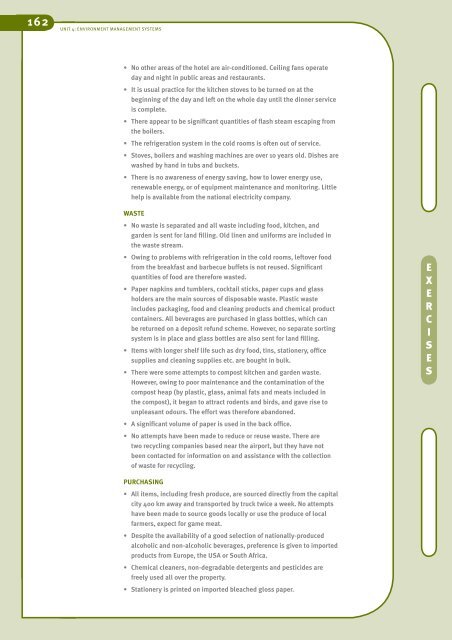Online version: PDF - DTIE
Online version: PDF - DTIE
Online version: PDF - DTIE
You also want an ePaper? Increase the reach of your titles
YUMPU automatically turns print PDFs into web optimized ePapers that Google loves.
162<br />
UNIT 4: ENVIRONMENT MANAGEMENT SYSTEMS<br />
• No other areas of the hotel are air-conditioned. Ceiling fans operate<br />
day and night in public areas and restaurants.<br />
• It is usual practice for the kitchen stoves to be turned on at the<br />
beginning of the day and left on the whole day until the dinner service<br />
is complete.<br />
• There appear to be significant quantities of flash steam escaping from<br />
the boilers.<br />
• The refrigeration system in the cold rooms is often out of service.<br />
• Stoves, boilers and washing machines are over 10 years old. Dishes are<br />
washed by hand in tubs and buckets.<br />
• There is no awareness of energy saving, how to lower energy use,<br />
renewable energy, or of equipment maintenance and monitoring. Little<br />
help is available from the national electricity company.<br />
WASTE<br />
• No waste is separated and all waste including food, kitchen, and<br />
garden is sent for land filling. Old linen and uniforms are included in<br />
the waste stream.<br />
• Owing to problems with refrigeration in the cold rooms, leftover food<br />
from the breakfast and barbecue buffets is not reused. Significant<br />
quantities of food are therefore wasted.<br />
• Paper napkins and tumblers, cocktail sticks, paper cups and glass<br />
holders are the main sources of disposable waste. Plastic waste<br />
includes packaging, food and cleaning products and chemical product<br />
containers. All beverages are purchased in glass bottles, which can<br />
be returned on a deposit refund scheme. However, no separate sorting<br />
system is in place and glass bottles are also sent for land filling.<br />
• Items with longer shelf life such as dry food, tins, stationery, office<br />
supplies and cleaning supplies etc. are bought in bulk.<br />
• There were some attempts to compost kitchen and garden waste.<br />
However, owing to poor maintenance and the contamination of the<br />
compost heap (by plastic, glass, animal fats and meats included in<br />
the compost), it began to attract rodents and birds, and gave rise to<br />
unpleasant odours. The effort was therefore abandoned.<br />
• A significant volume of paper is used in the back office.<br />
• No attempts have been made to reduce or reuse waste. There are<br />
two recycling companies based near the airport, but they have not<br />
been contacted for information on and assistance with the collection<br />
of waste for recycling.<br />
E<br />
X<br />
E<br />
R<br />
C<br />
I<br />
S<br />
E<br />
S<br />
PURCHASING<br />
• All items, including fresh produce, are sourced directly from the capital<br />
city 400 km away and transported by truck twice a week. No attempts<br />
have been made to source goods locally or use the produce of local<br />
farmers, expect for game meat.<br />
• Despite the availability of a good selection of nationally-produced<br />
alcoholic and non-alcoholic beverages, preference is given to imported<br />
products from Europe, the USA or South Africa.<br />
• Chemical cleaners, non-degradable detergents and pesticides are<br />
freely used all over the property.<br />
• Stationery is printed on imported bleached gloss paper.
















